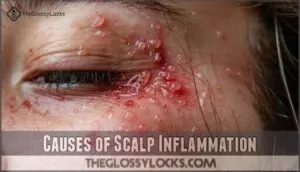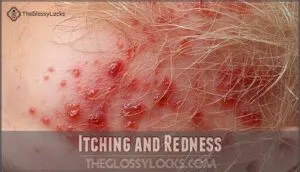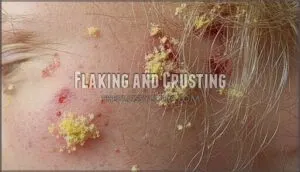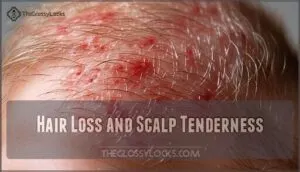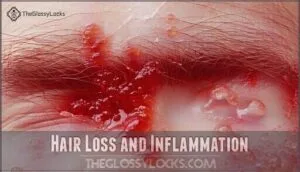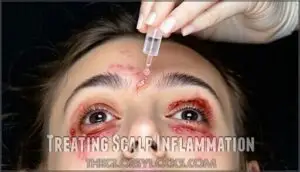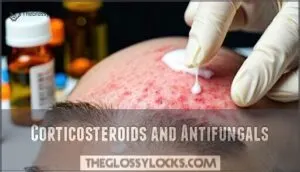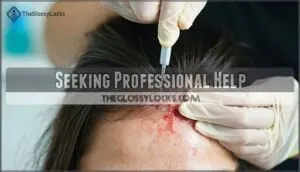This site is supported by our readers. We may earn a commission, at no cost to you, if you purchase through links.
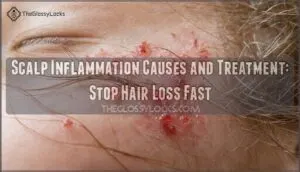
Common culprits include seborrheic dermatitis, psoriasis, fungal infections, and autoimmune conditions like alopecia areata.
You’ll typically notice redness, itching, flaking, and unfortunately, hair loss when follicles get caught in the crossfire.
Treatment depends on the root cause.
Antifungal shampoos tackle yeast overgrowth, while corticosteroids calm autoimmune flare-ups.
For bacterial infections, you’ll need antibiotics.
Don’t overlook lifestyle factors either – stress, poor diet, and harsh hair products can turn your scalp into a battlefield.
The good news? Most scalp inflammation responds well to targeted treatment, and your hair usually returns once the inflammation settles.
Timing matters though, because chronic inflammation can permanently damage follicles if left unchecked.
Table Of Contents
- Key Takeaways
- What is Scalp Inflammation
- Causes of Scalp Inflammation
- Symptoms of Scalp Inflammation
- Hair Loss and Inflammation
- Treating Scalp Inflammation
- Medications for Scalp Inflammation
- Managing Scalp Inflammation
- Seeking Professional Help
- Frequently Asked Questions (FAQs)
- Is scalp inflammation causing hair loss?
- What causes a scalp infection?
- What is scalp inflammation?
- How do you get rid of scalp inflammation?
- What causes scalp folliculitis?
- Why does my scalp hurt?
- What deficiency causes scalp inflammation?
- What foods trigger scalp inflammation?
- Can scalp inflammation cause permanent baldness?
- How long does scalp inflammation typically last?
- Conclusion
Key Takeaways
- Early treatment prevents permanent hair loss – You’ll protect your follicles from scarring damage by addressing inflammation quickly with targeted medications like corticosteroids or antifungals.
- Multiple causes require different approaches – You need to identify whether seborrheic dermatitis, psoriasis, infections, or autoimmune conditions are triggering your inflammation to choose the right treatment.
- Lifestyle factors fuel scalp problems – You can reduce inflammation by managing stress, avoiding harsh hair products, eating anti-inflammatory foods, and addressing nutrient deficiencies.
- Chronic inflammation destroys follicles permanently – You’ll face irreversible hair loss if you ignore persistent symptoms lasting over two weeks or severe conditions like scarring alopecia.
What is Scalp Inflammation
Scalp inflammation occurs when your scalp becomes irritated, red, and swollen due to various triggers like infections, allergies, or skin conditions.
You’ll typically notice symptoms such as itching, flaking, tenderness, and sometimes hair loss if the condition goes untreated.
Definition and Symptoms
Scalp inflammation occurs when your scalp becomes irritated, red, and swollen due to various triggers.
Common scalp inflammation symptoms include persistent itching, visible redness, and burning sensations.
Early indicators often start with mild scalp symptoms like tenderness or slight irritation.
Symptom severity ranges from occasional discomfort to intense pain affecting daily activities.
Defining characteristics include swelling, heat, and sensitivity to touch, signaling your scalp’s inflammatory response to underlying issues, which can lead to intense pain.
Common Causes and Triggers
Understanding what triggers your scalp inflammation helps you identify and avoid potential culprits before they cause lasting damage.
Several factors can turn your healthy scalp into an irritated, inflamed mess:
- Product Allergies – Shampoos, conditioners, and hair dyes containing harsh chemicals can trigger allergic reactions
- Environmental Irritants – Pollution, extreme weather, and airborne allergens damage your scalp’s protective barrier
- Stress Impact – Chronic stress disrupts natural oil production, creating conditions for inflammation
- Dietary Deficiencies – Lack of vitamins A, B, and zinc weakens your scalp’s ability to fight irritation
Causes of Scalp Inflammation
Understanding what triggers scalp inflammation helps you address the root cause and prevent hair loss.
Multiple factors can irritate your scalp, from common skin conditions to lifestyle choices that disrupt your scalp’s natural balance.
Dermatitis and Autoimmune Conditions
Several dermatitis and autoimmune conditions can trigger scalp inflammation.
Seborrheic dermatitis affects up to 90% of scalps, causing redness and flaking from Malassezia yeast overgrowth.
Scalp psoriasis creates thick, silvery scales through accelerated skin cell production.
Autoimmune alopecia like dissecting cellulitis causes persistent inflammation, and conditions like Lupus can have severe effects.
Lupus effects include red, scaly patches that may scar permanently, resulting from the autoimmune response and persistent inflammation.
Infections and Scarring Alopecia
Bacterial and fungal infections can wreak havoc on your scalp, causing inflammation that damages hair follicles and leads to scarring alopecia.
When infections attack your scalp, they don’t just irritate—they destroy hair follicles permanently.
Bacterial Folliculitis creates painful, pus-filled bumps along your hairline, while Tinea Capitis produces ring-shaped bald patches. These scalp infections don’t just cause temporary discomfort—they can destroy follicles permanently.
One such condition involves hair follicle destruction due to inflammation.
Here are 5 infections that can steal your hair:
- Tinea Capitis (Fungal Alopecia) – Creates expanding bald circles that won’t heal without treatment
- Bacterial Folliculitis – Turns hair follicles into infected, painful bumps that scar over
- Central Centrifugal Cicatricial Alopecia (CCCA) – Requires CCCA Diagnosis through biopsy for this autoimmune scarring condition
- Impetigo – Highly contagious bacterial infection spreading through direct contact
- Autoimmune Scarring Conditions – Attack your follicle stem cells, preventing any future hair growth
Environmental Factors and Lifestyle
Your daily environment plays a bigger role than you might think.
Weather effects like extreme heat or cold can strip your scalp’s natural oils, while pollution exposure from city air clogs pores and triggers irritation.
Stress impact disrupts your body’s natural balance, affecting oil production.
Dietary deficiencies in vitamins and minerals weaken your scalp’s defenses, making lifestyle changes essential for healing, which can help mitigate the effects of stress impact.
Symptoms of Scalp Inflammation
Recognizing scalp inflammation symptoms early helps you prevent permanent hair damage and choose the right treatment approach.
You’ll typically notice itching, redness, flaking, or tenderness that signals your scalp needs immediate attention, which is crucial for selecting the appropriate treatment.
Itching and Redness
Itching becomes your scalp’s alarm system, signaling inflammation through persistent scratching effects that worsen existing conditions.
Redness causes stem from increased blood flow to irritated areas, creating visible inflammation patterns. Severity levels range from mild discomfort to intense burning sensations requiring immediate itch relief.
Symptom overlap occurs when scalp inflammation causes merge with itchy scalp causes, making proper scalp inflammation treatment essential for effective scalp redness relief and thorough itchy scalp treatment.
Flaking and Crusting
Two telltale signs reveal scalp inflammation’s presence: flaking skin that resembles dandruff and crusting that forms protective scabs.
Flake severity varies from light dusting to thick, silvery scales in psoriasis.
Crust composition changes based on underlying conditions—bacterial infections create yellowish crusts while fungal issues produce dry, scaly patches.
Treatment options target root causes, while preventative measures include gentle cleansing and avoiding harsh products to manage scalp inflammation and its symptoms.
Hair Loss and Scalp Tenderness
Beyond the obvious irritation, scalp inflammation can trigger hair loss and significant scalp tenderness that makes everyday activities uncomfortable.
When follicle damage occurs, your growth cycle becomes disrupted, leading to thinning hair across various alopecia types. Remember that tight hairstyles cause pain.
Key signs of advanced scalp inflammation include:
- Increased hair shedding during washing or brushing
- Tender, painful scalp that hurts to touch
- Visible thinning in previously thick areas
- Itchy scalp that worsens with scratching
- Limited regrowth options without proper treatment
Hair Loss and Inflammation
When your scalp becomes inflamed, it doesn’t just cause discomfort—it can directly damage your hair follicles and disrupt the natural growth cycle.
Understanding this connection helps you take action before temporary irritation becomes permanent hair loss.
How Inflammation Leads to Hair Loss
When scalp inflammation strikes your hair follicles, it disrupts the natural growth cycle and triggers excessive hair shedding.
When inflammation attacks your follicles, your hair’s natural growth cycle gets disrupted and shedding accelerates.
Persistent inflammation causes follicle damage, weakening the roots and potentially leading to scarring alopecia.
The inflammation severity directly affects your regrowth potential—early treatment preserves healthy follicles and maximizes your chances of recovery.
Types of Hair Loss Associated With Inflammation
When scalp inflammation strikes, it can trigger different types of hair loss depending on inflammation severity and underlying causes.
Understanding these patterns helps you recognize what’s happening and seek appropriate treatment.
Here are the main types of hair loss linked to scalp inflammation:
- Non-scarring alopecia – Temporary hair loss where follicles remain intact, allowing hair regrowth with proper scalp inflammation treatment
- Scarring alopecias – Permanent follicle damage from chronic inflammation, preventing future hair growth in affected areas
- Autoimmune hair-loss – Patchy hair loss from conditions like alopecia areata, where your immune system attacks follicles
- Infectious hair loss – Hair loss from bacterial or fungal infections causing severe scalp inflammation and potential scarring
- Chemical-induced alopecia – Hair loss from harsh treatments or environmental exposures damaging follicles through inflammatory responses
The key difference lies in whether follicle damage is reversible, determining your potential for hair regrowth after addressing scalp inflammation causes.
One common cause is seborrheic dermatitis, which leads to red and greasy patches.
Preventing Hair Loss With Treatment
Through early intervention and treatment adherence, you can protect hair follicles from permanent damage.
Consistent scalp inflammation treatment prevents scarring that leads to irreversible hair loss.
Anti-inflammatory medications reduce follicle stress, while antifungals target underlying infections.
Following prescribed regimens guarantees follicle protection and creates favorable conditions for regrowth strategies to succeed.
Treating Scalp Inflammation
When your scalp becomes inflamed, quick treatment can prevent further damage and stop hair loss in its tracks.
The right combination of medications, home remedies, and lifestyle changes will calm inflammation and restore your scalp’s health.
Medications for Inflammation
Topical corticosteroids remain the gold standard for reducing scalp inflammation quickly.
These antiinflammatory medications like clobetasol propionate work directly on affected areas, calming redness and swelling.
Scale softeners containing salicylic acid help topical medications penetrate thick, crusty patches more effectively.
Antifungal shampoos target underlying yeast overgrowth, while oral medications provide systemic relief for severe cases.
Many options for scalp inflammation medications are available, offering various ways to address scalp inflammation and yeast overgrowth.
Medications for Infections
When infections take hold, targeted antimicrobial therapy becomes your first line of defense.
Oral antifungals like terbinafine tackle stubborn scalp ringworm, while topical antibiotics handle surface bacterial overgrowth.
Antiseptic solutions cleanse infected areas effectively. However, antibiotic resistance concerns require careful medication selection.
Pediatric dosages need precise adjustment for children’s scalp infection treatment, ensuring antifungal medications and antibiotic cream work safely together.
Alternative Therapies and Home Remedies
Beyond prescription medications, natural scalp remedies offer gentle alternatives that work alongside conventional treatments.
Tea tree oil‘s antifungal properties combat seborrheic dermatitis, while coconut oil moisturizes dry, irritated skin. Aloe vera soothes inflammation naturally, and dietary supplements support scalp health from within.
A great way to further promote hair growth is through regular scalp detoxing.
- Tea tree oil: Dilute with carrier oil and massage for 15-20 minutes to fight dandruff and folliculitis
- Coconut oil: Apply warm oil treatments for 30-60 minutes to reduce inflammation and moisturize
- Aloe vera gel: Use fresh gel directly on affected areas for 20-30 minutes to calm redness
- Stress reduction techniques: Practice meditation or yoga since chronic stress disrupts healthy sebum production
Medications for Scalp Inflammation
When scalp inflammation strikes, the right medication can quickly calm irritation and protect your hair follicles from damage.
Your treatment options range from gentle over-the-counter shampoos to prescription-strength corticosteroids, depending on what’s causing your specific scalp issues, which can be addressed with the right medication.
Corticosteroids and Antifungals
Corticosteroids like clobetasol quickly reduce scalp inflammation, while antifungal medications tackle fungal infections causing irritation.
You’ll find topical treatments safer than oral options, especially for pediatric use.
However, long-term corticosteroid use can cause side effects, and antifungal resistance may develop.
These scalp antifungal and corticosteroid treatments target different inflammation sources effectively.
Antibiotics and Anti-Inflammatory Medications
When bacterial infections like folliculitis cause scalp inflammation, antibiotics target the root problem.
Oral antibiotics work systemically, while topical versions treat localized areas.
However, antibiotic resistance concerns doctors, especially with long-term use.
Pediatric considerations matter since children’s scalps react differently.
Alternative anti-inflammatories like salicylic acid medicated shampoos offer steroid-free options, avoiding steroid side-effects while effectively treating inflammation.
Medications for Hair Regrowth
While treating infections helps reduce inflammation, your scalp may need additional support to recover from hair loss.
Hair regrowth medications work alongside anti-inflammatory treatments to restore follicle function and promote new growth.
Four key hair regrowth medications include:
- Minoxidil – FDA-approved topical treatment that increases blood flow to follicles, available in 2% and 5% strengths
- Finasteride effects include blocking DHT hormone production, helping prevent further hair loss in androgenic alopecia
- JAK inhibitors like ritlecitinib target autoimmune inflammation, showing 23% of patients achieving 80% scalp coverage
- PRP therapy uses your own platelets to stimulate dormant follicles naturally
These scalp inflammation medications require consistent use and patience – results typically appear after several months of treatment.
For those seeking minoxidil hair products, a variety of options are available.
Managing Scalp Inflammation
You can take control of scalp inflammation through targeted lifestyle changes that address root causes beyond topical treatments.
Managing your diet, stress levels, and daily habits creates a foundation for long-term scalp health while preventing future flare-ups.
Dietary Changes and Supplements
When scalp inflammation strikes, your diet becomes your first line of defense. Anti-inflammatory foods rich in omega-3 fatty acids and vitamins A, E can dramatically reduce symptoms while addressing nutrient deficiencies that fuel inflammation.
| Inflammation Diet Foods | Supplement Options |
|---|---|
| Salmon, walnuts, chia seeds | Omega-3 fish oil capsules |
| Spinach, sweet potatoes | Vitamin A supplements |
| Almonds, sunflower seeds | Vitamin E complex |
| Berries, leafy greens | Zinc for scalp repair |
| Olive oil, avocados | Probiotics for gut health |
Consider exploring a specific diet plan for managing scalp inflammation. Proper hydration impact can’t be overlooked—drink plenty of water to flush toxins while supporting your scalp’s natural healing process.
Stress Management and Lifestyle Modifications
Beyond managing what’s on your plate, stress management and lifestyle changes can dramatically improve your scalp’s health.
Chronic stress disrupts sebum production, creating the perfect storm for inflammation.
Try mindfulness practices like meditation or deep breathing to activate your body’s relaxation response.
Regular exercise benefits your entire system, boosting circulation to nourish hair follicles.
Don’t underestimate scalp massage—it’s like giving your head a mini-vacation while promoting healing.
A balanced diet can also help reduce dandruff and itchiness through lifestyle changes.
Monitoring and Maintaining Scalp Health
Daily monitoring transforms your scalp health journey from reactive crisis management to proactive prevention.
Check for redness, itching, or unusual changes during your regular hair care routine.
Choose gentle products free from harsh sulfates and allergens.
Stay hydrated—proper hydration importance can’t be overstated for healthy scalp function.
Schedule regular checkups with your dermatologist for ongoing scalp inflammation treatment guidance and preventative measures.
Seeking Professional Help
Recognizing when your scalp inflammation requires professional medical attention can prevent permanent hair loss and long-term complications.
Healthcare providers use specialized diagnostic tools and prescription treatments that aren’t available over-the-counter to address severe or persistent scalp conditions effectively, utilizing specialized diagnostic tools.
When to Consult a Healthcare Provider
Several red flags signal it’s time to contact your healthcare provider for scalp inflammation diagnosis.
Persistent symptoms lasting over two weeks, worsening conditions despite treatment, or severe pain warrant immediate attention.
Sudden hairloss, especially in patches, requires urgent scalp examination.
When treatment ineffectiveness becomes apparent after following prescribed regimens, professional medical treatment can identify underlying causes and adjust your care plan accordingly.
Addressing underlying medical conditions is essential for effective treatment.
This includes recognizing the need for immediate attention when symptoms persist or worsen, and understanding that severe pain can be a critical indicator of an underlying issue.
Diagnosis and Treatment Options
Healthcare providers use various diagnostic tools to pinpoint your scalp’s exact condition.
After visual examination, they might recommend scalp biopsy for complex cases or prescribe targeted treatments like topical steroids for inflammation.
- Scalp biopsy helps identify autoimmune conditions and scarring alopecia through tissue analysis
- Topical steroids reduce swelling and redness in psoriasis and dermatitis cases
- Antifungal shampoos target fungal infections like ringworm with specialized ingredients
- Oral medications treat severe bacterial infections or systemic inflammatory conditions
- Home remedies complement medical treatment with tea tree oil and gentle cleansing routines
Preventing Future Episodes of Inflammation
Once you’ve conquered the immediate inflammation battle, keeping it from returning requires consistent scalp inflammation care.
Think of prevention as your daily armor against future flare-ups.
| Prevention Strategy | Implementation | Frequency |
|---|---|---|
| Gentle Products | Use sulfate-free shampoos and hypoallergenic styling products | Daily/Weekly |
| Scalp Hygiene | Cleanse regularly without overwashing; rinse thoroughly | 2-3 times weekly |
| Stress Reduction | Practice meditation, exercise, or relaxation techniques | Daily |
| Healthy Diet | Include omega-3s, zinc, and vitamins A, B, E | Ongoing |
| Regular Checkups | Monitor scalp health with dermatologist visits | Every 6-12 months |
Your scalp inflammation prevention toolkit isn’t rocket science—it’s about building habits that support scalp inflammation management.
Skip harsh chemicals that strip natural oils, manage stress before it manages you, and fuel your body with nutrients that strengthen your scalp’s defenses.
These scalp inflammation solutions and remedies work best when you’re consistent, not perfect.
Frequently Asked Questions (FAQs)
Is scalp inflammation causing hair loss?
Yes, scalp inflammation can definitely cause hair loss.
When your scalp’s inflamed, it weakens hair follicles and disrupts normal growth cycles, potentially leading to temporary or permanent hair loss if left untreated.
What causes a scalp infection?
Bacterial or fungal overgrowth causes scalp infections.
You’re dealing with organisms like Staphylococcus bacteria or Malassezia yeast that multiply when your scalp’s natural balance gets disrupted by poor hygiene, excessive oiliness, or weakened immunity.
What is scalp inflammation?
Up to 90% of people have Malassezia yeast on their scalps.
Scalp inflammation occurs when your scalp becomes irritated, red, and swollen due to infections, allergies, or conditions like seborrheic dermatitis and psoriasis.
How do you get rid of scalp inflammation?
Treat scalp inflammation with medicated shampoos containing salicylic acid or coal tar. Apply topical corticosteroids for severe cases. Use antifungal treatments if needed. Avoid scratching and harsh products.
What causes scalp folliculitis?
Ironically, your hair follicles—designed to protect—become inflamed when bacteria or fungi invade these tiny openings.
You’ll develop folliculitis from bacterial infections, fungal overgrowth, or irritation from harsh products and frequent shaving, which can be caused by various factors including bacterial infections.
Why does my scalp hurt?
Your scalp hurts because inflammation from conditions like seborrheic dermatitis, folliculitis, or psoriasis causes redness, swelling, and nerve irritation, creating tenderness and pain when touched.
What deficiency causes scalp inflammation?
Like a garden starved of nutrients, your scalp rebels when lacking essential vitamins.
Deficiencies in vitamins A, B-complex, and zinc weaken your scalp’s barrier function, disrupting sebum production and triggering inflammation that leads to irritation and flaking, causing your scalp to suffer from inflammation.
What foods trigger scalp inflammation?
You’ll want to avoid sugar, refined carbs, processed foods, dairy, spicy foods, and anything you’re allergic to. These trigger insulin spikes and inflammatory responses that can worsen scalp irritation.
Can scalp inflammation cause permanent baldness?
Yes, scalp inflammation can cause permanent baldness if left untreated.
Persistent inflammation damages hair follicles, disrupting growth cycles.
Conditions like scalp ringworm and autoimmune disorders create scarring that prevents regrowth permanently, leading to permanent baldness.
How long does scalp inflammation typically last?
Duration varies widely depending on the underlying cause.
Contact dermatitis typically resolves within 2-4 weeks after removing triggers, while chronic conditions like seborrheic dermatitis require ongoing management with medicated shampoos for lasting relief.
Conclusion
Remarkably, your scalp’s healing journey mirrors nature’s own recovery cycles.
Understanding scalp inflammation causes and treatment empowers you to break the cycle of irritation before permanent damage occurs.
Whether you’re dealing with seborrheic dermatitis, fungal infections, or autoimmune conditions, targeted treatment works when you identify the root cause early.
Don’t let chronic inflammation steal your hair’s future—take action now and watch your scalp transform from battlefield to healthy foundation for lasting hair growth.
- https://xyonhealth.com/blogs/library/scalp-inflammation-and-hair-loss
- https://www.happyhead.com/blog/is-scalp-inflammation-causing-your-hair-loss
- https://pubmed.ncbi.nlm.nih.gov/39384736/
- https://www.aad.org/public/diseases/hair-and-scalp-problems/scalp-psoriasis/diagnosis-and-treatment/shampoos-scale-softeners-and-other-treatments
- https://www.aocd.org/page/Folliculitis

